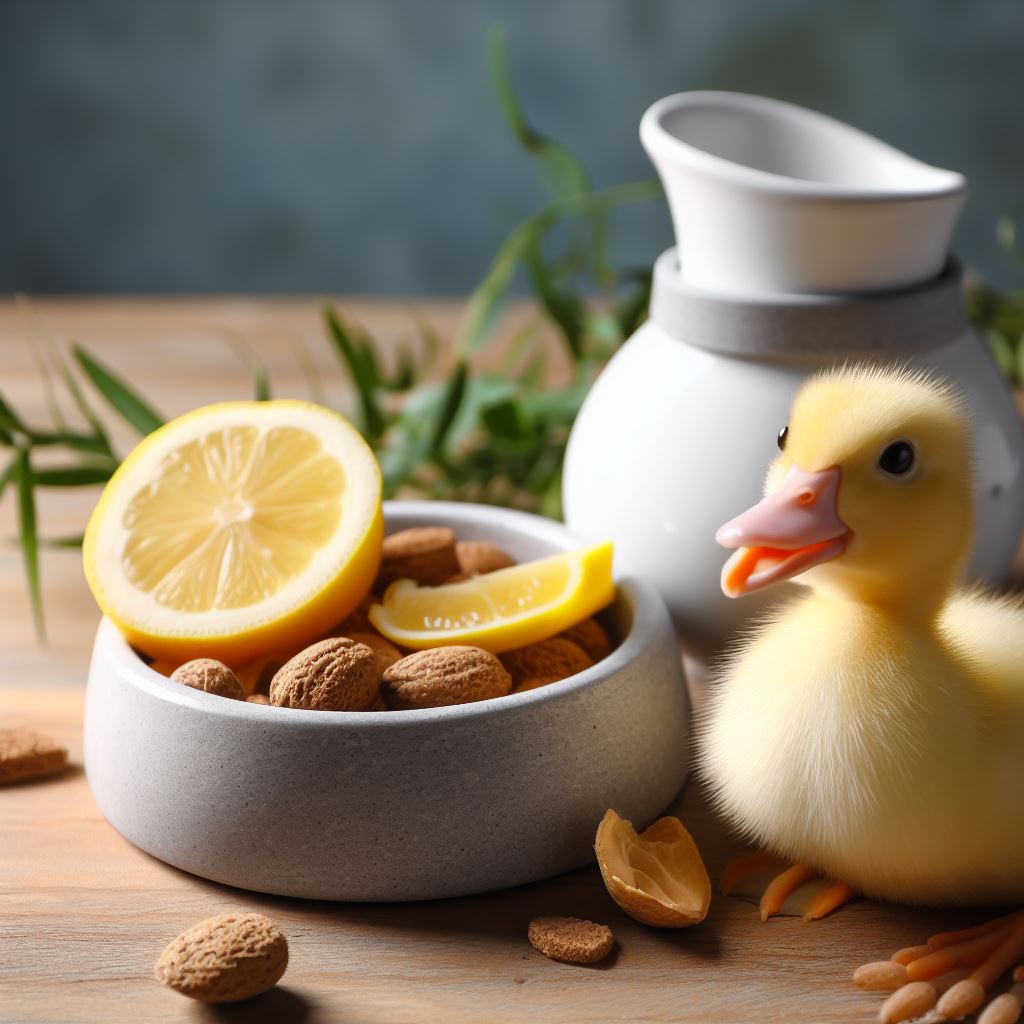Can Ducks Eat Lemons?

Table of content:
Yes, ducks can eat lemons in moderation as an occasional treat. However, lemons should not make up a significant part of a duck’s diet. Lemons provide some beneficial nutrients but too much can upset digestion. Limit to 1/4 lemon 2-3x a week.
Lemons are a familiar citrus fruit that adds brightness and acidity to many dishes. Their tart, refreshing flavor makes lemons a popular ingredient. This article will explore whether ducks can eat lemons, the benefits and risks, and how to safely feed small amounts of lemon to ducks.
Benefits of Lemons for Ducks
Lemons contain nutrients that can benefit duck health when consumed in small amounts. Specifically:
- Vitamin C: Lemons are loaded with this antioxidant vitamin. Vitamin C promotes immunity and collagen formation.
- Citric acid: This compound aids digestion and gives lemons their sour taste. It serves as an antimicrobial as well.
- Bioflavonoids: These compounds have antioxidant properties.
- Potassium: This electrolyte supports nerve transmission and muscle function.
- Folate: Lemons contain some of this B vitamin. It’s needed for DNA and cell health.
So in moderation, lemons can provide valuable vitamins, minerals, and compounds. The citric acid can support digestive health. Their antioxidant content may boost immunity too.
Risks of Feeding Ducks Too Many Lemons
However, lemons do pose some risks for ducks when over-consumed. Here are a few to keep in mind:
- Acidity: Too much citric acid can irritate or burn a duck’s sensitive mucous membranes. It may cause painful sores in the mouth or esophagus.
- Nutrient imbalance: Large amounts of any treat can create an imbalance between vitamins, minerals, fats, and protein in the diet.
- Dehydration: The high water content in lemons can cause fluid loss.
- Weight issues: Overeating high-carb or sugary foods like fruit can promote obesity.
- Digestive upset: Any new food may disrupt digestion, causing loose feces or diarrhea.
To avoid these issues, lemons should only be an occasional indulgence. They should not make up more than 5-10% of your duck’s total food intake.
 Feeding Lemons to Ducks Safely
Feeding Lemons to Ducks Safely
You can allow your ducks to enjoy the benefits of lemons in a safe way. Follow these tips:
- Wash thoroughly: Rinse lemons under water to remove dirt, debris, and possible contaminants. Scrub the rind gently if needed.
- Cut small: Dice lemons into quarters or small pieces that are easy for ducks to manage.
- Limit quantity: No more than 1⁄4 of a lemon 2-3 times per week per duck. Adjust as needed.
- Watch for reactions: If loose feces, irritation around the mouth, changes in eating, or other concerning symptoms arise, stop feeding lemons.
- Keep hydrated: Ensure ducks have continuous access to fresh, clean water. This will help dilute acidity and prevent dehydration.
- Feed at mealtimes: Offer lemons when also feeding their regular grain ration. This prevents overconsumption.
With limited quantities and proper precautions, most ducks can enjoy lemons safely. Discontinue use if any adverse reactions occur.
How to Prepare and Serve Lemons for Ducks
Here are some simple ways to serve lemon treats to your flock:
- Wedges: Cut into quarters or eighths. Place one piece in each duck’s feed bowl during mealtimes.
- Diced pieces: Carefully dice lemon flesh into tiny cubes. Sprinkle a few over grain or floats.
- Mixed into foods: Try adding a small amount of lemon juice or grated lemon peel to wet mashes, veggies, or oatmeal.
- Frozen into ice cubes: Mix a few diced lemon bits into cubes of water or diluted juice. Serve outside on hot days.
- Dried slices: Use a dehydrator or low oven to dry paper-thin slices. Break into smaller pieces to feed.
Avoid adding table sugar or sweeteners when preparing lemon for ducks. Also steer clear of cooking methods that use oil, salt, seasonings, or other additives. Simply wash, cut, and serve raw.
Signs That Lemons Are Safe or Unsafe for Your Ducks
Monitor your ducks when first offering lemons. Here are signs that lemons are okay or not tolerated:
LEMONS ARE SAFE IF DUCKS:
- Eagerly consume portion provided
- Digest without issue
- Keep eating their normal diet
- Have normal droppings
- Show no irritation or inflammation
DISCONTINUE IF DUCKS:
- Refuse lemons or eat around them
- Develop runny feces or diarrhea
- Have redness, sores, or irritation in mouth
- Lose appetite for regular food
- Drink noticeably more water
- Become lethargic or show signs of illness
Adapt serving sizes down or up slightly based on your ducks’ tolerance. Discontinue lemons completely if any adverse reactions occur.
With prudent feeding practices, most ducks can enjoy small amounts of this tart, refreshing citrus as a periodic treat. Use caution and restraint when offering lemons to ducks. Stop immediately if problems arise.
Frequently Asked Questions
Can baby ducks eat lemon?
No. Ducklings should not eat any acidic citrus fruits. Wait until ducks are fully mature before offering small lemon pieces infrequently.
Do wild ducks eat lemons?
Wild ducks do not typically consume citrus fruits. But they may nibble on discarded lemon wedges or rinds on occasion.
What about limes, oranges, or grapefruit?
Other citrus fruits also have high acidity. They can be fed in very limited amounts but may be best avoided.
Can lemon peel be fed to ducks?
Small amounts of peeled lemon flesh are safer. The outer yellow peel is difficult to digest and provides little nutritional value.
Why do ducks like lemons?
Ducks enjoy the novel tartness and seem attracted to the bright, vibrant color. Lemons offer diversity from their typical diet.
Are Meyer lemons safer?
All citrus varieties are acidic. Meyer lemons have a milder flavor but pose the same risks if over-fed.
Can ducks have lemonade?
No. Lemons naturally contain enough sugars. Avoid offering ducks sweetened lemonade or other sugary drinks.
Conclusion
In moderation, lemons can be a fun occasional treat that provides nutritional variety for ducks. About a quarter of a lemon 2-3 times weekly is a reasonable amount.
Always monitor ducks closely when offering new foods. Discontinue lemons immediately if any irritation, digestion issues, or other concerning symptoms arise.
With sensible precautions, your flock may be able to enjoy the tangy brightness of lemons as part of their diverse diet.
Welcome. I’m Adreena Shanum, the proud owner of this website, and I am incredibly passionate about animals, especially poultry. I founded adreenapets.com as a labor of love, stemming from my desire to share my knowledge and experiences with poultry enthusiasts worldwide.




